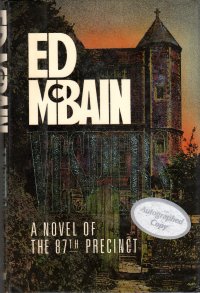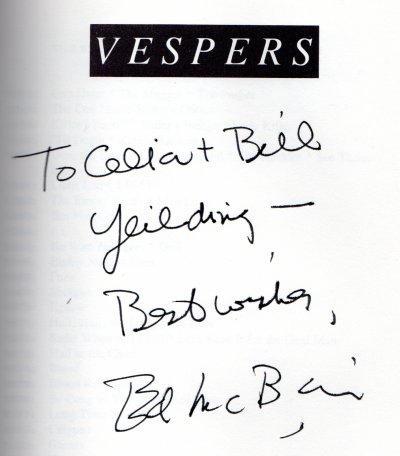 I first read this book fifteen years ago (or, at least, I first reported on it fifteen years ago). That was when the book was fifteen years old, so basically its age has doubled. Mine, almost, too. Or so it feels sometimes.
I first read this book fifteen years ago (or, at least, I first reported on it fifteen years ago). That was when the book was fifteen years old, so basically its age has doubled. Mine, almost, too. Or so it feels sometimes.
At any rate, this book precedes Widows, and as I mentioned, I spotted this volume on my bookshelves right after I read that book. I ordered this book last spring from ABC Books during the beginning of the Ongoing Unpleasantness; I got it because it is an autographed copy.
Not only is it autographed, but it is inscribed.

Much like the English copy of The Caribbean Mystery, I have to wonder how it ended up in Springfield, Missouri, for me to pick up.
The book has two unrelated plots: Carella and Hawes investigate the murder of a priest, and they have a bunch of suspects: A member of the congregation who has a beef with the priest; a member of the Satan-worshipping church down the street, whose rites are described in some tawdry detail; members of the the church staff; a local drug dealer who might have hidden drugs in the church; local youths/drug distributors who chased the drug dealer into the church after the drug dealer stole the drugs; someone who might be having sex with and/or blackmailing the priest; and the eventual murderer. The second features Marilyn Hollis, the former prostitute who is involved with Detective Willis, whose past catches up with her in the form of two South Americans who want the money she stole from her former pimp when she killed him.
The first plot moves a little recursively, as the stories of each person change according to the other peoples’ stories, until Carella returns to the scene and uncovers additional evidence that allows him to solve the mystery pretty quickly; the other meanders to a conclusion abruptly.
So not the best of the lot, but still an engaging read, and I read it in three nights, so pretty fast for my modern pacing.
I ended up picking it up because, when I was handling Widows, I saw that it was a selection of the Literary Guild. Which is a book club. So this is my Book Club Selection for the Winter 2021 Reading Challenge.
Oh, and I did mark some things as I went along.
Anachronism Alert
“This was late in the afternoon,” Krissie said, “this black kid came running into the church with his head all bloody. Hald a dozen white kids were chasing him with stickball bats and garbage can covers, chased him right into the church, right up the center aisle to the altar.”
I am not convinced a twenty-two year old woman from Minnesota would use the term stickball bat, especially since everyone else in the book calls it a baseball bat.
Attacking George Bush
I might have mentioned that in the 21st century, McBain let some sucker punches into his work. But here in 1990, he also criticises the earlier George Bush:
The black man in America knew where it was at. And where it was at was not here, not in these mean streets. Where it was at was uptown someplace, so far uptown that the black man had never been there, could not even visualize it there, knew only that uptown was a shining city somewhere high on a hill, a promised land where everyone went to Choate and Yale and a thousand points of light glistened in every cereal bowl.
Read my lips, Carella thought.
A little zinger for Reagan, too, who borrowed shining city on a hill from John Winthrop.
The Baddest Word
Clearly, there is a black kid in the book and it muses on racial questions, so we get the superbad word.
In the movie theater, sitting there in the dark with mostly white people, Hooper likes to wet his pants laughing every time Eddie Murphy does another one of his shrewd things. White people all around him are laughing, too. Not at any dumb nigger but at dumb Charlie who the nigger’s fuckin’ around. Hooper doesn’t completely understand why all these white people are laughin’ at theyselves, but he knows it makes him fell damn good.
Yeah, the superbaddest word of all appears throughout this book; it should be cancelled harder than Widows. But McBain does capture something of race relations at the time–Eddie Murphy’s characters were protagonists, black but relatable, and even white folk could identify with him. However, that’s not allowed or encouraged now–it’s not our shared humanity to discover and celebrate, but our assigned categories to defend.
Tie-In To Something I Just Saw
Marilyn wondered if there were such things as passionate, poetic men who looked like lions and made their homes in subway caves.
I just saw the intro for Beauty and the Beast when reminiscing about the New Shows of 1987.
McBain Knew No Goths
Carella recognized in the group of teenagers the two young girls he’d spoken to yesterday. They were dressed more sedately today, not in black–this was largely an alien color in a young person’s wardrobe–but in dark shades of blue that seemed appropriate to the day’s burden.
Apparently no metalheads either. In my high school years which ended in 1990, black was not uncommon.
Anachronism Alert (II)
One of the white local youths:
So we were, I don’t know, showing off for the girls, clowning around. I remember Allie was doing his imitation of what was supposed to be Tony Bennett singing I Lost My Heart in San Francisco, but he sounded more like Jerry Lewis, did you ever hear Jerry Lewis sing?
Probably not what a group of teens in 1990 would be doing, imitating Tony Bennett but sounding like Jerry Lewis.
Asimovian Self-Insertion
“Carlos Ortega,” Morente read out loud from the computer screen, and then turned to the faxed record and said, “Carlos Ortega,” and then kept turning his head from screen to paper like a spectator watching a tennis match, comparing records, speaking the facts out loud, “forty-two years old, born October fifteenth,” and said in an aside to Willis “Birthdate of great men” but did not amplify, “six feet three inches tall, two hundred and sixty-five pounds, brown eyes, bald with black sideburns, this is some kind of miracle, broken nose, knife scar over right eye, they sound like twins except your guy was born in Argentina and this guy in El Salvador.”
Ed McBain was born on October 15, you see?
White Privilege Alert
McBain also includes several slurs for white people and one for the Italians:
This was getting to be a regular reunion of WOPS, the World Order for the Prevention of Subterfuge, a watchdog society dedicated to the proposition that any American born with an Italian name must keep that name forever, neither changing it completely nor even Anglicizing it, lest he be mercilessly and eternally hounded to his grave with reminders that he is meely an ignorant peasant with hoity-toity pretensions.
As you might remember, Ed McBain’s birth name was Salvatore Lombino; he later changed it to Evan Hunter. Note that the aforementioned Tony Bennett also violated this precept and changed his name to a more American-sounding name.
So he is pointing out that anti-Italian prejudice and the reaction, Italians ‘policing’ themselves to find people who are not authentic enough, existed in living memory. Which, unfortunately, is not living memory to many people in the 21st century, or it would maybe give them some perspective other than what they’re given by the authorities.
At any rate, I flag things to comment on just so I can give a little more to these book reports. I don’t want to be pedantic, and I don’t want to spend hours composing these book reports, so you’re getting, for the nonce, a comment on things that strike me while reading the book.
In sum, I liked the book, and I tried to keep the Doritos dust off of this since it’s a warmly inscribed first edition, so it might be briefly collectible until the remainder of us who like to read physical books and not just content delivered to our devices and managed/’curated’ by big tech companies. Especially books with bad words in them even when the thoughts were, for the time, good.


